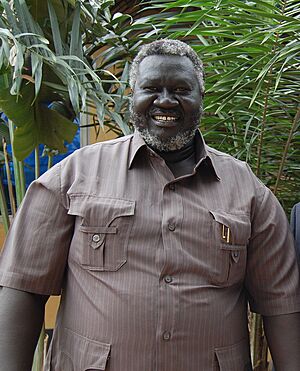Malik Agar facts for kids
Quick facts for kids
His Excellency
Commander General Malik Agar
|
|
|---|---|
|
مالك عقار
|
|

Agar in 2009
|
|
| Deputy Chairman of the Transitional Sovereignty Council | |
| Assumed office 19 May 2023 |
|
| Chairman | Abdel Fattah al-Burhan |
| Preceded by | Hemedti |
| Member of the Transitional Sovereignty Council | |
| Assumed office 11 November 2021 |
|
| In office 2 February 2021 – 25 October 2021 |
|
| Chairman of the SRF | |
| Assumed office February 2012 |
|
| Chairman of SPLM-N | |
| Assumed office February 2011 |
|
| Governor of Blue Nile State | |
| In office April 2010 – 2 September 2011 |
|
| Personal details | |
| Born |
Nganyofa Agar Eyre Nganyofa'
Ingessana Hills, Blue Nile State, Republic of Sudan |
| Political party | SPLM-N |
| Occupation | Politician, soldier |
| Military service | |
| Allegiance | Sudan People's Liberation Movement |
| Years of service | 1983–present |
| Battles/wars | Second Sudanese Civil War Sudanese conflict in South Kordofan and Blue Nile War in Sudan (2023–present) |
Malik Agar (Arabic: مالك عقار, romanized: Mālik ʻAqqār; born Nganyofa Agar Eyre Nganyofa) is a Sudanese politician and former insurgent leader who was active in the insurgency in Blue Nile state. Since 2023, he has been the deputy chairman of the Transitional Sovereignty Council, Sudan's ruling military junta.
Early life
Malik Agar was born Nganyofa Agar Eyre Nganyofa to an Ingessana chief in Blue Nile State. He did not know he was a Muslim until he was eight. His headteacher gave him the name "Malik" and told him he was a Muslim. From then on, he was called "Malik Agar Eyre".
Second Sudanese Civil War
Agar joined the Sudanese armed opposition shortly after the beginning of the Second Sudanese Civil War in 1983.
In the 1990s, he was the commander of a section of the Sudan People's Liberation Movement (SPLM) military forces along the Ethiopia–Sudan border south of the Blue Nile to Geissan. SPLM units under his command captured the towns of Kurmuk and Qaissan in 1997.
Agar was close to John Garang, and shared his goal of overthrowing the Government of Sudan, as opposed to fighting for the secession of South Sudan. After Garang's death, Agar, along with others who shared a desire for a revolution in Sudan, were marginalised by the new SPLM leadership. Agar expressed his disapproval of the secession of South Sudan to a US official in 2009, stating that it would cause the eventual splintering of the rest of Sudan.
Post-Civil War
He was elected governor of Blue Nile State in the Republic of the Sudan in April 2010. Agar was one of the few high-profile members of the Sudanese opposition to run in the election, and was the only non-National Congress Party (NCP) candidate to win a governorship. Agar defeated the NCP candidate, Farah Ibrahim Mohamed Al-Aggar, by 108,119 to 99,417 votes.
In February 2011 Malik Agar also became chairman of the Sudan People's Liberation Movement–North, the part of the SPLM that operates in northern Sudan. The southern portion of the SPLM became a separate political party in South Sudan when the country seceded from the Republic of Sudan in July 2011.
On 2 September, Agar was deposed as governor on the orders of President Omar al-Bashir. He fled to the southern part of the state and was reportedly planning a counterattack. He warned that the Sudan–SPLM conflict may ignite a wider Sudanese civil war.
In February 2012 Agar helped found the Sudanese Revolutionary Front (SRF); a coalition of Sudanese opposition groups that aims to overthrow the Sudanese government and replace it with a democracy. In February 2012, Agar was elected president of the SRF.
On 2 February 2021, he was appointed as a member of the Sovereignty Council of Sudan.
Ideology
Agar rejects President Omar al-Bashir's vision of an Arab-Islamic state, and has argued instead for a multicultural civil democracy.
See also
 In Spanish: Malik Agar para niños
In Spanish: Malik Agar para niños

